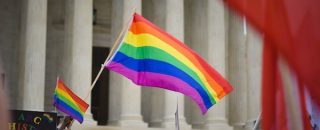The LGBT and allied community in San Antonio is busy preparing for the decision from the Supreme Court on whether same-sex marriage is protected by the Constitution. The eventual ruling could be a landmark moment for LGBT civil rights.
The court accepted cases from four states — Ohio, Michigan, Kentucky and Tennessee — where restrictions on same-sex marriage were upheld by an appeals court in Cincinnati in late 2014. The Supreme Court heard extended arguments in those cases this year on April 28. The announcement of the Court’s decision could come as early as mid-June but most likely will come near the end of the month.
On June 11, the nonpartisan Public Religion Research Institute released a poll that found nearly two-thirds of Americans expect the Supreme Court to legalize same-sex unions.
Enthusiasm is running high in San Antonio where the local chapter of the Human Rights Campaign is planning a “Marriage Equality Decision Day” gathering on the steps of the Bexar County Courthouse on Main Plaza. The date for the event is fluid (from June 26 to 29) to account for the uncertainty of when the Court will announce its decision.
Texas for Marriage is hosting a Decision Day gathering at six locations around the state on the day the Supreme Court announces its ruling. In San Antonio the gathering is at 6 p.m. at the Lutheran Church of the Good Shepard at 1630 Goliad Road.
The Unity Church of San Antonio wasted no time in announcing if the Supreme Court decision finds marriage equality legal, it plans to marry same-sex couples throughout the day on July 4 at their sanctuary on the Northeast side. Rev. Linda Martella-Whitsett told the San Antonio Express-News that faith drove her congregation to plan the weddings.
In a press release last month the church wrote:
Countless same-sex couples have been unable to marry the ones they love, many raising families, without the benefits available to heterosexual married couples such as spousal health insurance benefits, Social Security benefits, spousal retirement benefits and spousal survivor benefits.
Imagine spending a lifetime with someone, then being unable to make health care decisions for them when they are very sick because you are not ‘family.’ All of that is about to change. This is sure to be a joyous day you don’t want to miss.”
The church is charging a $25 fee and anticipates multiple weddings performed all day long on July 4. (Use this link for registration form and additional information.)
Two of the plaintiffs in the Texas marriage case, former San Antonians Vic Holmes and Mark Pharris who now live in Plano, are optimistic about the Supreme Court’s decision, so much so that they started planning their wedding and are taking ballroom dancing lessons in order to prepare for the big day.
Holmes and Pharris, along with Cleopatra DeLeon and Nicole Dimetman of Austin, filed their original federal lawsuit challenging the state’s marriage ban on October 28, 2013 in San Antonio. On November 22 of that year, they sought a preliminary injunction to bar Texas from enforcing the ban. Their case went to court on February 11, 2014.
Two weeks after the hearing, Judge Garcia declared Texas’ ban on same-sex marriage unconstitutional and issued a stay on his decision that is still in effect.
On January 9, the U.S. Court of Appeals for the 5th Circuit in New Orleans heard appeals of same-sex marriage cases from Texas, Mississippi and Louisiana. However, the 5th Circuit justices, perhaps anticipating the Supreme Court’s decision, delayed their ruling and offered no time frame as to when it will be announced.
One local official who’s pledged to support same-sex couples who wish to marry is Bexar County Clerk Gerard C. “Gerry” Rickhoff.
Last year, when it looked like U.S. District Judge Orlando L. Garcia might lift the stay on his decision that found the Texas equal marriage ban unconstitutional, Rickhoff told the Texas Observer:
. . . he’s prepared to keep his office open 24 hours a day to accommodate same-sex couples seeking marriage licenses, including those from surrounding counties where clerks may decline to issue them.
. . . in addition to keeping his office open ’round-the-clock, he’s considering setting up tables in Main Plaza to accommodate same-sex couples. Rickhoff said he’s also lined up district judges to waive a 72-hour waiting period before ceremonies can occur, as well as officiants to conduct them.
“There’s a pent-up demand to stop these civil rights violations that are pretty evident,” Rickhoff said.



